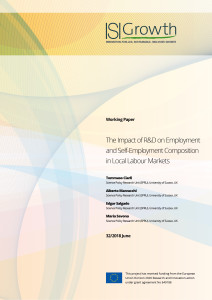This paper investigates the effect of firms’ investment in R&D on employment level and composition in UK local labour markets. We distinguish the impact of R&D across areas with different initial shares of workers in routinised occupations and industry specialisation and for different sectors, levels of education, paid employment and self-employment, and age cohorts. Drawing on two instrumenting strategies, our results consistently suggest that R&D growth, on average, exerts no multiplier effect on local employment, but changes its composition. Results differ significantly by the initial level of routinisaton. Low routinised areas experience a relative reduction in low educated employment in non tradeable services and self-employment. In highly routinised areas, low education employment is created in no tradeable services; a significant share of this is in self-employment, concentrated in the 25-34 age cohort, whereas the 17-24 cohort is negatively affected. We qualify the effect of R&D on the nature of self-employment and find no evidence to distinguish if it is driven by R&D related opportunities or necessity.
The Impact of R&D on Employment and Self-Employment Composition in Local Labour Markets
Tommaso Ciarli
Science Policy Research Unit (SPRU), University of Sussex, UK
Alberto Marzucchi
Science Policy Research Unit (SPRU), University of Sussex, UK
Edgar Salgado
Science Policy Research Unit (SPRU), University of Sussex, UK
Maria Savona
Science Policy Research Unit (SPRU), University of Sussex, UK

